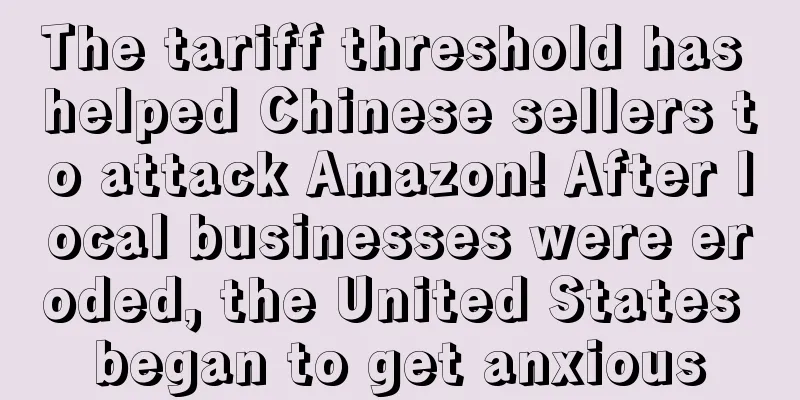|
▲ Video account attention: cross-border navigation It is learned that Shenzhen has more than 40,000 cross-border e-commerce companies, accounting for about 35% of China's entire cross-border industry. This shows that Shenzhen plays an important role in China's cross-border e-commerce industry. However, this year some cross-border e-commerce companies in Shenzhen have suffered an unprecedented blow - the account blocking campaign initiated by Amazon has swept across most of the cross-border circle, and countless sellers have suffered setbacks. This major industry rectification initiated by the platform has also attracted attention from many parties. Previously, the Shenzhen Commerce Bureau announced the convening of a symposium for cross-border e-commerce companies. The research outline of the conference pointed out the various operational difficulties caused by the account blocking wave to companies, and also provided specific government assistance measures in a targeted manner. ▲ The picture comes from the Internet Just when the seller thought that there was a turning point in his account being blocked, a report poured cold water on him. Shenzhen government remains “neutral” amid account blocking wave It is reported that tens of thousands of Chinese sellers have been affected by this collective ban. Earlier, there were reports that some of the banned sellers would jointly file a lawsuit against Amazon and seek government assistance. Cross-border navigation Shenzhen government refuses to support sellers in suing Amazon? Cross-border e-commerce may usher in a major reshuffle in the industry! #Amazon##Cross-border headlines#Cross-border e-commerce video account According to the South China Morning Post, an official from the Shenzhen Municipal Bureau of Commerce said the government would remain "neutral" in the dispute between Amazon and Chinese sellers. ▲ Picture from South China Morning Post In a meeting with sellers on Friday, the government rejected calls to support sellers in taking legal action against Amazon. The same official told the sellers that if they could not prove that they had not violated Amazon's platform rules, the government would not be able to help their cause, the sources said. However, the government would assist the sellers affected by this by referring them to legal counsel. It is learned that this year, Amazon has successively released and revised a series of targeted delisting and store closure rules, on the grounds that a large number of Chinese sellers have poured in and engaged in malicious competition, disrupting the market order. ▲ The picture comes from Amazon Global Store However, many sellers still have doubts about Amazon's platform rules. Whether the account blocking policy is completely fair and whether it is targeted at Chinese sellers remains to be discussed. The report said that while some sellers may not accept the response, the Shenzhen government's position is consistent with that of China's Ministry of Commerce. The government has previously responded to the wave of store closures: the various risks and challenges encountered by cross-border e-commerce companies in the process of going overseas are a temporary "inadaptability", and the government will also help companies maintain their "legitimate rights and interests" on the premise of complying with international standards. Without the government's "protection umbrella", sellers' road to rights protection is still long and difficult, and the future fate of China's cross-border e-commerce industry may also face rewriting. Cross-border e-commerce may face a major reshuffle in the industry What does large-scale account blocking mean to the entire industry? Sellers who have experienced it should have a deep understanding of this. A small move by Amazon is like a mountain to the sellers who rely on it for their livelihood. This long-lasting turmoil has also triggered a butterfly effect in the industry, with chain reactions such as frozen corporate funds, layoffs, and backlogs of goods in factories, which have overwhelmed people from all walks of life. ▲ The picture comes from the seller communication group In this regard, Zhang Zhouping, director of the B2B and cross-border e-commerce department of the E-Commerce Research Center of the China Internet Network Information Center , said that this Amazon "store closure" incident has at least two impacts on the industry. First, the industry will also develop in a formalized direction and must comply with platform rules to operate; second, it will have an impact on the distribution model, promoting the development of independent sites, social networks , search engine marketing, etc. In addition, some people also think that this is an opportunity. For some small and medium-sized sellers who operate in compliance with regulations, the ban of the top sellers can break the long-term monopoly of the big sellers on traffic, so that the products of small and medium-sized sellers have a better chance to rank among the top and obtain more traffic. It is learned that this wave of account blocking has not ended, and sellers of varying sizes are still being involved in this storm. The categories of accounts blocked are not limited to 3C sellers, even accounts in categories such as lamps and home furnishings have been blocked. Therefore, some industry insiders speculate that Amazon’s actions will not stop abruptly, and more severe punishment measures will be taken against sellers’ violations, which will trigger a collective reshuffle in the cross-border e-commerce industry. Some sellers said that perhaps after a period of time, white hat tactics will become the mainstream in the circle, and industry sellers will gradually move towards compliance. However, this wave of account closures has also taught many sellers a lesson, which is to diversify risks and find other alternative platforms. The wave of account bans has prompted sellers to quickly find alternative platforms “Don’t put all your eggs in one basket.” This is the biggest realization of a seller after experiencing the account suspension wave. In fact, many sellers have already started to do this. It is reported that as Amazon cracks down on platform violations, Chinese sellers are looking for alternative online retail markets to reach overseas consumers, and some of them have begun investing in international online retail platforms such as AliExpress, eBay, and Shopify. ▲ Picture from South China Morning Post After the Shenzhen government expressed its "neutral" attitude towards the account blocking trend, it also accelerated the process of sellers looking for other alternative platforms. At the same time, the Shenzhen Municipal Government has also issued relevant policies to encourage enterprises to conduct cross-border e-commerce business through independent station channels. Eligible enterprises will receive a maximum of 3 million yuan in funding. ▲ The picture comes from Shenzhen Municipal Bureau of Commerce People do not share the same joys and sorrows. Third-party sellers on Amazon are in dire straits, but the independent sites are doing very well. The successful overseas expansion of Anker Innovations and shein has greatly boosted the confidence of Chinese sellers in entering the independent sites. As more and more sellers join the independent station camp, they have also begun to pay attention to high-quality website building platforms on the market.
As the preferred website building platform for cross-border e-commerce brands to go global, Youzan AllValue can provide merchants with extremely fast website building, as well as international version of mini programs, extreme mobile and overseas social marketing and other overseas solutions to help independent website merchants quickly expand overseas markets!
For more details, please add 18702530437 (same number on WeChat) for free consultation! For Amazon sellers, transforming from a platform to an independent website is not a matter of a day or two. It often takes some pain before seeing the rainbow.
|










